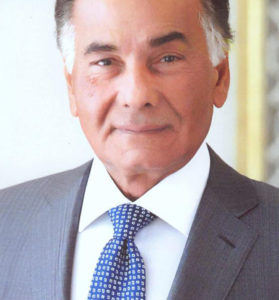
Atlanta—Mohamed Farid Khamis, founder of Oriental Weavers, passed away at Emory Hospital, here, on Sept. 19, 2020, due to complications from a long-term illness.
Khamis was a legendary businessman in the global area rug industry and built on that success to expand his enterprise into other industries, which created opportunities for a growing workforce in Egypt and beyond.
From a single loom in 1979, Oriental Weavers has emerged as the largest producer of machine-woven and tufted room-sized carpets globally. The group and its subsidiaries today employ more than 22,000 people in Egypt, China and the USA.
Khamis was born on April 14, 1940, in Sharkia, Egypt. Since his childhood, he believed Egypt and its people were strong, creative and capable of great success if proper opportunities were available. While Khamis is well known for his business successes, philanthropy and efforts to bring new industries and opportunities to the people of Egypt, many are not aware of his history beyond those public achievements.
In 1967, Khamis was forced to leave his country due to his opposition to the current government and its actions. He began a new life in Kuwait. Upon arriving in Kuwait, he found work as an accountant with a local carpet and flooring distributor. As he became more involved in all areas of their business, he looked at new opportunities to help the company expand beyond its current customers and Kuwaiti borders. Over the following decade, Khamis developed great partnerships with the founders of the largest carpet and flooring manufacturers worldwide and eventually became the largest importer of European and American flooring into the Middle East.
Under the new leadership of Anwar Sadat in the late 1970s, Egypt’s government began its initiative to privatize businesses and industries to create non-government, self-sustaining industries and jobs for the Egyptian people. As Khamis’ business flourished across the Middle East, members of President Sadat’s cabinet made him aware of Khamis’ great success in the flooring industry.
Sadat contacted Khamis with an invitation to return to Egypt and a proposal to assist in the creation of a rug and carpet manufacturing and export company based in Egypt. Khamis and his family returned to Egypt in 1978 and he began construction of a new carpet and area rug manufacturing company under the name Oriental Weavers.
The factory was built in a small desert town outside of Cairo that was newly designated as a government duty-free zone called the 10th of Ramadan City. From the city’s humble beginnings at that time, the 10th of Ramadan City now serves as home to nearly 1,000,000 Egyptian citizens who work in export industries that benefit all people of Egypt.
Beyond Khamis’ Oriental Weavers, he also founded MAC Carpet, Egyptian Fiber Company (EFCO), Oriental Weavers USA (OW USA), Oriental Weavers China (OWC), Egyptian Petrochemical Company (EPP), Oriental Petrochemical Company (OPC) and Oriental Urban Developments (OUD), which invests and operates real estate developments in the tourism, residential, industrial and agricultural sectors.
In addition to his work with his own companies, Khamis has long served as the chairman of the Egyptian Investors Federation, chairman of the Egyptian Committee for the International Chamber of Commerce, president of the Arab Council for a Green Economy, and many more over the last 40 years.
The Egyptian Investors Federation mourned the business tycoon in a statement on Saturday: “Egypt has lost a great patriotic figure, who spent his life serving this nation, loving every bit of its pure soil.”
Beyond his work in the industrial and investment sectors, Khamis’ success allowed him to continue his dream of strengthening the future of Egypt. In 1995, he founded the Al Shorouk Academy of Higher Learning, which now serves more than 12,000 students. In 2005, he partnered with the British Council and Loughborough University to open The British University in Egypt (BUE). BUE now has more than 11,000 students enrolled each year with degrees in 14 disciplines ranging from engineering to medical fields to the arts.
Social responsibility was at the heart of Khamis’ values and he met that responsibility through his philanthropic M.F. Khamis Foundation and Khamis Foundation for Community Development. These foundations build hospitals, donate medical equipment, renovate schools, provide students with tuition grants, sponsor orphanages and renovate houses of worship. These foundations will continue their work under the direction of his children.
Khamis is survived by his wife (Miloslava), two daughters (Yasmine and Farida), a son (Mohamed) and three grandchildren (Omar, Malak and Osama). Khamis’s body will be returned to Egypt for burial.
